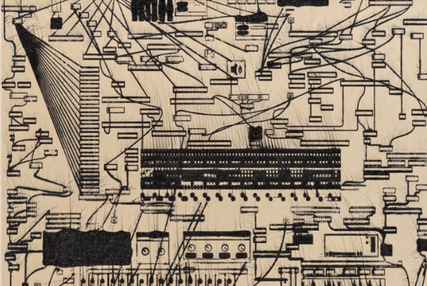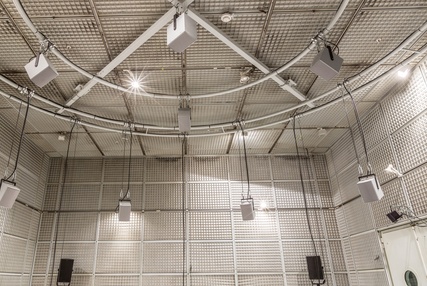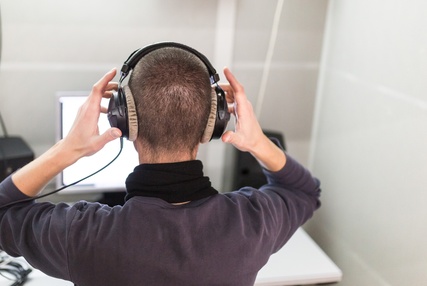10h00- 17h30
Français
Initiation
Tarif plein
:
1650 €
Mbre Forum Premium
:
1155 €
Étudiant.e
:
825 €
Max est un logiciel de programmation graphique qui permet de traiter, de générer et d'interagir avec des données MIDI, des flux audio, vidéo, et tout autre type de données, comme celles provenant de capteurs.
![]()
Objectifs pédagogiques
À l'issue de la formation, les stagiaires auront acquis les compétences nécessaires à l’élaboration de patchs simples. Ils seront capables d'évaluer de manière autonome les besoins nécessaires au montage d'un projet faisant appel à Max.
La formation est suivie par un examen pour l’obtention du certificat Ircam Max niveau 1 : un test d’évaluation du niveau d’utilisation du logiciel Max en situation professionnelle.
Public concerné
Toute personne créative souhaitant monter un projet où Max peut s'avérer nécessaire : compositeurs, compositrices, développeurs, développeuses, interprètes, techniciens et techniciennes du son, chorégraphes, créateurs et créatrices sonores, vidéastes, live-codeurs, live-codeuses, enseignants et enseignantes en musique ou en arts plastiques, "makers", chercheurs et chercheuses dans le domaine de l'informatique musicale...
Prérequis
- Connaissance des bases de l'informatique musicale (son numérique, protocole MIDI).
- Bonne connaissance d'un séquenceur logiciel (station de travail audio-numérique DAW) tel que Pro Tools, Logic, Reaper ou autre et d'un logiciel d’édition audio (WaveLab, Sound Studio, Audacity, Adobe Audition...).
- Bonne connaissance des éléments de vocabulaire de la langue anglaise utilisés dans les logiciels usuels.
- Maîtrise de l’utilisation des principales fonctionnalités de l'ordinateur Mac (connaissance et manipulation du clavier et de la souris, créer et gérer des fichiers et des dossiers, naviguer dans les menus, lancer une application).
- Des notions élémentaires en mathématiques faciliteront la compréhension : nombres entiers, rationnels et décimaux, sommes, soustractions, multiplications, divisions, valeur absolue, étude de fonctions simples.
En amont de cette formation, il est fortement recommandé aux participant·e·s de télécharger Max et de le faire fonctionner en version démo (30 jours avec les fonctionnalités complètes) pour réaliser au minimum les exercices tutoriels Max 1 à 6 (Max Basic Tutorials 1-6. Ouvrir "Reference" dans le menu Help pour accéder à ces tutoriels).
Durée de la formation et modalités d’organisation
36h, du lundi 24 au samedi 29 novembre 2025, 10h-13h et 14h30-17h30
10 stagiaires maximum
Au cas où ils ne pourraient avoir lieu en présentiel, la formation et le passage du certificat Ircam ne pourront pas être maintenus.
Programme de la formation
Attention, Jitter ne sera pas abordé.
Certains détails du programme de la formation sont susceptibles d’être révisés en fonction des évolutions des logiciels sur lesquelles elles se fondent.
Lundi
| Matin | Découvrir l'environnement de Max, de son paradigme et de ses contextes d'utilisation. |
| Après-midi | Identifier la problématique lors de l’exécution de processus en temps réel et maîtriser les principes de l'ordre d'exécution (<trigger>) Analyser et comprendre un flux de données MIDI et le manipuler en temps réel : usage des objets dédiés au protocole MIDI (<midiin>, <notein>, <ctlin>, <bendin>…) Contrôler un synthétiseur MIDI via un clavier MIDI. Implémentation d'effets MIDI : transposition, générateur d'accords, « écho MIDI ». |
Mardi
| Matin | Approfondissement de la manipulation des données : groupes de données (listes et boîte de messages). |
| Après-midi | Approfondissement des algorithmes de génération de notes MIDI aléatoires : manipulation conditionnelle des groupes de données (<list>), programmation d'un « arpégiateur ». |
Mercredi
| Matin | Se familiariser avec le fonctionnement de l’audio dans Max. |
| Après-midi | Réalisation, contrôle et amélioration pas à pas d’un synthétiseur monophonique joué à partir d’un clavier. |
Jeudi
| Matin | Découvrir et utiliser les objets fondamentaux dédiés à l’enregistrement et à la lecture de sons à partir d'un fichier (<sfplay~>, <playlist~>) ou d’une mémoire tampon (<buffer~>, <play~>, <groove~>…). |
| Après-midi | Introduction aux traitements audio en temps-réel : modulation d’amplitude, modulation en anneau, lignes à retard, écho, et leurs implémentations dans Max. |
Vendredi
| Matin | Effets audio en temps-réel basés sur la modulation d’une ligne à retard : chorus et flanging. |
| Après-midi | Analyser le flux audio et en extraire des informations pertinentes à l’aide de modules simples : suivi d’amplitude et suivi de hauteur (<yin~>, <sigmund~>). Premiers pas vers une architecture globale d'un patch plus complexe : organisation modulaire intégrant plusieurs des processus réalisés durant la semaine. |
Samedi
| Matin | Découvrir et gérer les ressources externes de Max : usage des bibliothèques externes, package manager. |
| Après-midi | Examen |
Moyens pédagogiques et techniques
- Salle de formation équipée d’ordinateurs Mac mini avec les logiciels utilisés, de casques audios et de claviers MIDI
- Format de la formation : la formation alterne entre des exposés théoriques, l'étude d'exemples à analyser, et des travaux pratiques (accompagnés et individuels).
- Supports pédagogiques : présentations vidéo-projetées. Un support de cours sera remis au début de la formation et des fichiers complémentaires seront fournis au fur et à mesure.
Les environnement Max et Ableton Live ne sont pas inclus dans le tarif de la formation et non fournis à l’issue de la formation.
Suivi
- Accueil le premier jour de la formation à partir de 9h45
- Contrôle du suivi par la signature d’une feuille de présence pour chaque demi-journée
- Remise d’un certificat de réalisation et des résultats de l’évaluation
.Évaluation
- Examen de certificat Ircam Max niveau 1 passé à l’issue de la formation. Test de connaissances sous forme de questions-réponses et exercices / cas pratiques (3h)
Certificat Ircam - Max niveau 1
3h, samedi 29 novembre 2025, 14h30-17h30
10 personnes maximum
L’examen de certificat Ircam se compose de deux parties (1h30 chacune) :
- un test de connaissances sous forme de questions-réponses (questions ouvertes et commentaires de captures d'écran)
- après une pause, une série d'exercices place les candidates et candidats face à plusieurs cas pratiques concrets, de difficulté croissante. Ils doivent penser et concevoir des solutions, comme s’ils étaient en situation professionnelle (test sur ordinateur Mac, avec le logiciel Max)
L’examen n’est pas une évaluation du suivi du stage mais un test d’évaluation du niveau d’utilisation du logiciel Max en situation professionnelle.
Le jury, composé d’un formateur ou d’une formatrice, réalisateur.trice en informatique musicale chargé.e de l'enseignement à l'Ircam et d'un ou d’une spécialiste du logiciel, évaluera les 3 critères principaux suivants :
- Théorie : restituer des connaissances basiques portant sur le logiciel Max et son environnement (vocabulaire du système MIDI et audio, conventions de programmation
- Analyse : analyser et interpréter le fonctionnement de programmes Max, et proposer des solutions de « debugging »
- Application : appliquer ces connaissances et compétences à travers la conception et la réalisation de programmes Max interactifs aux spécifications précises
Un certificat avec indication des résultats sera remis aux participants 3 semaines après le passage de l’examen.






